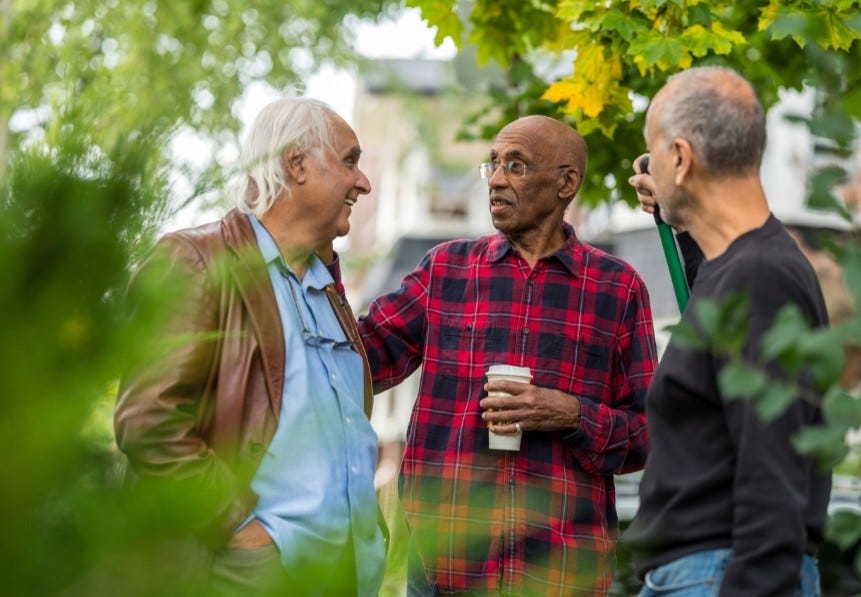Who Is Your Neighbor?
Showing mercy is not optional
Do you feel overwhelmed by the needs of those around you and struggle with guilt that you’re not doing enough to help? In a world filled with suffering, brokenness, and heartache, Christians are called to “Love your neighbor as yourself” (Matthew 22:39). But how is love defined, and who qualifies as your neighbor?
As we start our new series, Loving Your Neighbor as Yourself, we attempt to clarify this culturally relevant and often confusing topic. In this episode, hosts John and Shay are joined by their friend and fellow pastor Nathan Tiemeyer to tackle the question: Who is your neighbor and how are you called to love them?
Through the lens of the Parable of the Good Samaritan, they explore the biblical command to love others, who we’re called to love, and how to do so wisely. If you’re feeling cynical, burdened by the needs of others, or are seeking practical ways to love others well, this episode - and ultimately, this series - will offer hope and clarity so that you can love your neighbor with knowledge, insight, and intentionality.
Listen as John, Shay, and Nathan discuss:
The radical scope and biblical definition of the term “neighbor”
How spiritual bankruptcy puts you in a position of needing help and mercy
What God does - and does not - expect from you when it comes to meeting the needs of others
How Augustine’s Ordo Amoris (order of love) provides an intentional but discerning perspective on loving others as yourself
A Christian perspective on immigration and loving the immigrant in your community
This discussion will free you up to accept that you can’t love everyone, but you can show love to the person in front of you. As you consider how to “love your neighbor as yourself”, the simplest place to start is to do for one what you wish you could do for everyone, trusting God to guide your love and multiply your impact.
Highlights from John, Shay, and Nathan’s Conversation
In the parable of the Good Samaritan, Jesus gives us several important principles that answer the question “Who is your neighbor?” - a burning question thousands of years ago and one that is still important to answer today.
In Luke 10, Jesus describes a man who is robbed and attacked on a road and left there wounded with his clothes in tatters. Several religious leaders come by and see the man but go on without helping him because they are selfish and fear for their own safety. Finally, a Samaritan man approaches and helps the wounded man, even taking him to an inn and paying for his care.
Jesus tells this shocking story in response to an expert in the law who comes one day to test him. The lawyer asks, “Teacher, what must I do to inherit eternal life?” The first thing to note is that when this parable is used today to make spiritual, cultural, and even political points, its most foundational truth is about salvation.
Jesus asks this man in return, “What's written in the law?” The law expert correctly sums up the law as, “Love the Lord your God with all your heart, soul, mind, and strength, and love your neighbor as yourselves.” Jesus tells the man to go and do exactly that. But the law expert wants to narrow the ‘neighbor category’ to make it easier to fulfill. So, he asks Jesus another question, “Who is my neighbor?” And that’s when Jesus tells the parable.
The Jews of Jesus’ day believed that the Samaritans were second-class citizens and not worthy of respect. There were ceremonial differences in worship between the two groups and slightly different ethnicity. By choosing to have the Samaritan rescue the man on the road, Jesus was upending their idea of who could be a neighbor and who could be needy.
Rather than putting ourselves in the place of the men who came along and didn’t help, or even in the place of the Good Samaritan, Jesus wants us to see that we are all like the man who was attacked and is lying in the road. We’re all spiritually bankrupt before God, and even our best works are like filthy rags to him.
Who Is Your Neighbor?
If, as described in the parable, a Samaritan can love a Jew, and a Jew is called to love a Samaritan, that draws a big circle on who your neighbor is – in some sense, there is nobody that can’t be included. Your neighbor can really be anyone!
We know from the rest of the Bible that God provides righteousness for us through Christ. Jesus is not implying that you can be saved by imitating the Good Samaritan, although you are to use him as an example of selfless, sacrificial love. Rather, Jesus wants you to humble yourself, see the love that God requires of you, and be ready to give and receive it.
Jesus is not implying that you can be saved by imitating the Good Samaritan, although you are to use him as an example of selfless, sacrificial love. Rather, Jesus wants you to humble yourself, see the love that God requires of you, and be ready to both give and receive it.
This parable teaches that you must humble yourself to see that ‘the only thing you contribute to your salvation is your sin’, as Jonathan Edwards put it. But in addition, it makes the important point is that mercy is not optional. In other words, the work of showing mercy and loving the less fortunate is fundamental to being a Christian.
Don't lean toward either extreme: that helping the needy is a problem for the government to solve, or that it’s a problem for big business and a good economy to solve. In James, it says, "What kind of faith says to a man, "‘Be warm and well fed’ without helping to meet his physical needs?” James goes on to say that faith without works is dead.
Are You to Love Everyone the Same Way?
The Bible gives guidelines and priorities in terms of how you show love. First, God has made you as a finite creature. While he has a limitless supply of attention, resources, and energy, you do not. So it’s not even possible for you to love everyone the same way at all times.
Secondly, one of the things that God does is sovereignly place you in circumstances with particular people: family, friends, colleagues, and neighbors. Those circumstances are not an accident on his part. You have more responsibility to show love to those who are closest to you.
As Augustine, one of the great theologians of church history, put it, "Since you cannot do good to all, you are to pay special regard for those who, by the accidents of time or place or circumstance are brought into closer connection with you.”
You have an obligation to see to the welfare of your spouse and kids before tending to someone else’s spouse or kids. In Ephesians 5, Paul says, “In the same way, husbands ought to love their wives as their own bodies. He who loves his wife, loves himself. For this reason, a man will leave his father and mother and be united to his wife and the two will become one flesh.” The principle here is that you leave your family of origin and your spouse and children become your main priority.
Paul says, "Therefore, as we have an opportunity, let us do good to all people, especially to those who belong in the family of believers." You have more responsibility to the people in your church family than for those outside of it. And you have more responsibility to help people in your neighborhood or community that are in need or have experienced a significant tragedy or disaster than people who live far away.
Conditions and Limits of Love
What does it mean to love your neighbor? Our culture defines love in a couple of ways. One definition is a warm, positive emotion towards something or someone. It’s also defined as accepting or endorsing whatever someone wants to think or do no.
But the biblical definition of love has an emotional dimension that recognizes the proper worth of things - you don’t love all things or all people the same way. It also means acting in service to someone; showing ‘love’ won't always be endorsing or accepting what they want to do. An obvious example is when you don't let your young child touch the hot stove, no matter how much they want to; you're not going to let them do that because you love them.
Jesus doesn't ever do anything less than perfectly love the people around him. Yet in Mark 8 he tells his disciples, “I'm going to Jerusalem and I'm going to suffer many things. I'm going to be handed over and eventually crucified." Peter starts rebuking Jesus because of this. Jesus responds, in love, "Get behind me, Satan. You do not have in mind the concerns of God, but merely human concerns." The loving thing to do in that case was for Jesus to let Peter know that he was standing in the way of God's plan. Love means speaking the truth.
For example, at our church, we have a benevolent fund. When someone in our church has a need, we're able to help with that. We help with things like rent, or food, or a bill, when someone loses a job, for example. But we do ask, are you being a good steward of your finances? Do you have a budget? Are you living within your means? You don’t have to give without conditions.
Finding Your Place in Service to Others
Because you’re finite, without unlimited time, energy, and money, it’s important to identify your spiritual gifts – giving, encouraging, teaching, and serving, for example – and then find a way to serve that uses your gifts. You can’t meet every need and request you get to serve, even within your own church. Instead, find one area that God puts on your heart and be involved in that to the best of your ability.
As we continue our Loving Your Neighbor as Yourself series, you’ll hear about different organizations that are ministering to people and might be tempted to get involved with all of them! Ask God where he’d like you to serve and listen for his voice. Remember the great advice, “Do for one what you’d like to be able to do for all”. God will multiply the impact of your service when you use your gifts to help the people around you.
Thank you to Nathan Tiemeyer for joining us today! Be sure to listen in as John, Shay, and Nathan continue their discussion by tackling some hot button questions, including immigration and giving money to people in public places:





